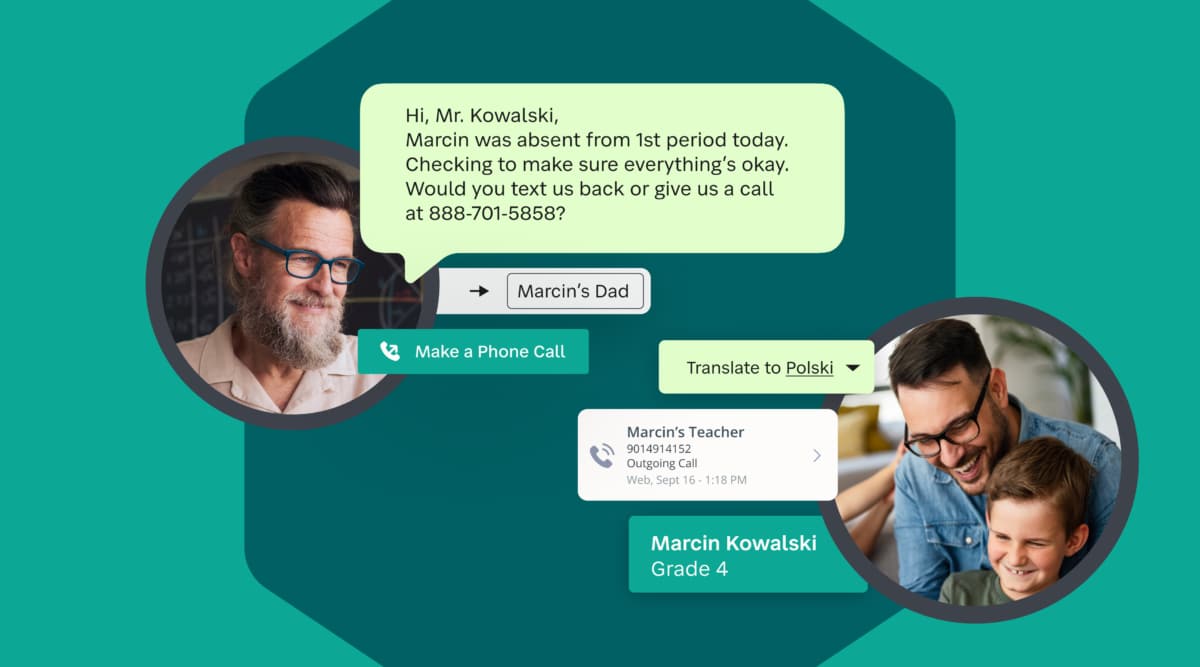

Every school has a group of highly involved families—the ones who always bake, chaperone the field trips, sign up as Class Family, run for committees, and attend PTO meetings. There are also families schools rarely see—those not attending conference day, not participating in events, or not responding to teacher emails.
Too often, families who are less visible at school are written off as being disengaged in their child’s education. However, what we may perceive as less activity in school doesn’t mean that families are not involved in their student’s success. Perhaps we need to broaden our understanding of what barriers families may be experiencing and explore how we can strengthen our connections. The more effort we put into reaching every family, the more success our school community can realize.
SchoolStatus Connect Advanced Tier helps you engage every family. The data-based communication hub allows schools to easily bridge school-home communication divides with updates in the family’s preferred language and channel—including SMS, email, phone. SchoolStatus Connect also offers alternatives on the portal so families can choose how, where, and in what language they want to receive messages. You can build classroom communities with event notification and volunteer coordination directly in the portal, which also makes event management easy. With the ease of connection comes better chances of response.
While there are many reasons families might seem disengaged and unresponsive, let’s look at a few common barriers and offer suggestions for how to help bridge them.
Language and Culture Barriers

Some families have attended the same school system for generations. There are also families who might be new to the district or to the country. New families may be unfamiliar with the rhythms and routines of the school system. Emergent Bilingual families might struggle with language barriers. Other families may not know the customs of the area.
How to Help:
- Set up a buddy system. When new families arrive, introduce them to other members of the school community. Linking up with returning—or alumni—families can foster inclusion and support beyond the classroom. If new families are initially hesitant to reach out to the school, they might feel better connecting with other families to help guide them until they are more comfortable.
- Implement translatable 2–way communications. SchoolStatus Connect automatically translates your school–home messages and allows you to have direct contact with families. Questions that arise, feedback to share, and solutions to discuss can establish trust and encourage involvement.
- Be explicit about school customs and culture. As families are adapting to new environments, help by explaining any guidelines or practices that are common in your school. Share tips and resources that may not be common knowledge to all.
- Encourage students & their home adults to share their cultural traditions with your class. Inclusion and representation in our classrooms are key for helping everyone feel like they belong. Hold school events to celebrate diverse ethnicities, customs, and traditions. See more ideas for activities in “7 Ways to Celebrate Your Multicultural Classroom.”
- Send a weekly translatable classroom update so families know exactly what their students are learning. Provide a brief summary of key topics covered in class. Adding some conversational tips––like “Ask your child about…” questions—enables families to continue the conversation at home and offer their own ideas on the subjects.
Economic or Other Family Hardships
Many factors limit time and resource flexibility. Families who are food or housing insecure, who rely on shift work or are unemployed, who don’t have childcare, or have limited access to safe and reliable transportation aren’t going to be able to make it to school as easily. It’s not because they don’t want to—it’s because they can’t. This is when we have to make the effort to bring school to them.
How to Help:
- Use your weekly class update to bring families into your classroom, virtually. Include pictures of students at work and of the classroom set up. SchoolStatus Connect’s digital newsletters can broadcast your classroom activities and show off students’ progress.
- Make a point of regularly reaching out 1:1 via translatable text with cheerful, positive updates about their child (if you have a less cheerful update to share, families will receive it better when they know you also see the good in their child).
- Offer video conference time slots for conference days or look for a mutually convenient time for a video conference. If you can, invite families to “stop by anytime” to encourage future in-person engagement. When you do meet face to face, make sure to ask how else you can help accommodate.
A Negative Prior History with School
If someone had a negative experience in school, or if their child has a history of difficulty at school (or both!) that home adult could have developed a strong aversion to talking to teachers. Past mistrust or feelings of mistreatment can prevent families from wanting to respond to school invitations.
How to Help:
- If you feel this might be the case—or maybe you have been directly told it is—work to reestablish yourself as a caring presence in their child’s life and education, and as a supportive presence in theirs. Make it your mission to connect and shift past narratives through positive and consistent outreach. Showing families that you value their opinions and want to find ways to rebuild for future involvement can work toward a more trusting environment.
- Solicit family input and show you know and support their child. Share positive feedback from some of your time working with their child. Then, ask if there are other ideas the family has for continued success. Families know better than anyone how to support their child. Show that you value their knowledge and hope to continue to work with them to strengthen their involvement in the school community.
While there are many other bridges to build, we can start by crossing some of these to reach our shared goal of student success.
SchoolStatus Connect Advanced Tier
Reach families and engage through the channels they prefer
Learn MoreStay Connected
News, articles, and tips for meeting your district's goals - delivered to your inbox.


















